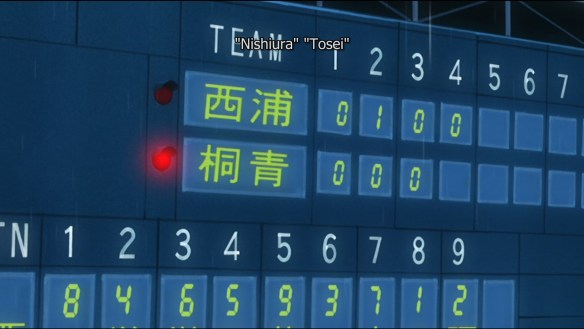Hello folks, and welcome back to Wrong Every Time. Today we’re returning to the field for a fresh episode of Big Windup!, as our boys from Nishiura struggle to defeat Tosei, the first-seeded team of the summer tournament. Our last episode was an absolute nail-biter of an inning, with Tosei dominating the bases and nearly running away with the game altogether. Though they failed to score in the end, their run of hits and smart manipulation of the bases demonstrated a team in realignment, now prepared for Mihashi’s pitches and ready to crush their unpracticed opposition.
That this inning could provoke such intensity without even touching the scoreboard is a credit to both Asa Higuchi’s tactics-rich writing and Tsutomu Mizushima’s thoughtful adaptation. Higuchi has laid out both the mechanical and psychological conflicts of this match with such clarity that each new twist feels a domino falling naturally into place, his narrative capably demonstrating the strategy underlying each shift on the board. And Mizushima has proven himself one of the most gifted directors of grounded, tactics-rich visual drama, turning concepts as fanciful as “girls in an after-school tank club” into feasts of stratagems and counterplays. With Tosei now snapping at Nishiura’s heels, let’s return to Big Windup!
Episode 18
We open right on the scoreboard, revealing Nishiura’s single run and our placement in the middle of the fourth inning. A choice that reflects how dedicated this production is to following the precise back-and-forth of the ongoing match; there’s no summary or montage here, no “overall pace of the game” simplification, we are actually following each shift in fortunes in real time
One strike and one out as Mihashi continues to face off with Tosei’s finest. With two men still on base, the inning could still easily turn disastrous. Baseball is sort of a funny sport that way – it’s generally quite low-scoring, and most of the drama concerns overcoming the vast hurdles standing between a runner and home plate, but it can also facilitate these “dam bursting” moments where runners get past the pitcher and are all sent home at once. Fielding in baseball is like overseeing a barricade of toothpicks
Nice composition for this next batter’s attempted bunt, with the frame positioned such that the ball bounces directly back at the viewer. Aside from being an inherently energetic composition, it also emphasizes the accidental trajectory of this bunt, revealing it’s going straight back to Mihashi
The consequences here reflect the shifting nature of the battlefield – because of the increasing rain, the ball doesn’t really bounce in the dirt, instead holding fast in the mud. As a result, as the game goes on, players’ ability to run to the ball will be increasingly tested. Additionally, players don’t tend to regularly practice in the rain, meaning this could be a test of experience on a less-familiar playing field – a factor that definitely favors the more seasoned Tosei players
Mihashi runs for it himself, tossing it to Abe as he collapses. A victory for the team, but also an echo of Mihashi’s issue not valuing his own body enough
Nonetheless, it’s also a psychological victory for Mihashi, who gets to hear the crowd cheering for him specifically, again validating his presence here. Abe undoubtedly sees this too, and thus only briefly checks if Mihashi is injured before also boosting his spirits
Kawai notes Abe’s cool, in that he didn’t go for the ball even when it was right in front of him, understanding it was more important to guard home. Absolute mental discipline is Abe’s great strength, a strength he does his best to impart on his teammates
“My first at-bat went outside, outside, inside…” thinks Kawai, demonstrating another quirk of baseball’s repetitive structure and psychological conflict. The pitcher can’t risk getting so repetitive that they throw an obvious pitch, while the batters will of course have their full history in mind when they come up to the plate. Another reason it’s risky to stick with one pitcher for too long in a game
Mihashi once again spooks the third-base runner by giving him that goggle-eyed stare. Don’t worry dude, Mihashi’s just like that
Kawai skims the bottom of the ball, sending it up into an easy catch. Three outs!
“When you defend well in an inning, the next offense goes well, too!” Momoe’s words emphasize the psychological truisms underlying so much of this show’s drama – for as much as smart tactics are essential, controlling the emotional flow of the match is just as important. Confident players do better
Some nice flourishes of character acting for our nervous Mihashi, who has a tendency to become some kind of bizarre melting creature in his emotional fits
Abe tells him not to hit today, before saying he’s “just kidding” and giving the go-ahead. He’s trapped between two urgent needs here: maintaining Mihashi’s body and maintaining Mihashi’s mental state. It’s clear that a full game like this will exhaust Mihashi, and also clear that Mihashi won’t actually make any adjustments in light of this until he simply collapses. But if pulling Mihashi from the batting order fucks with his confidence in pitching, then that’s even worse than overstressing his legs. Abe continues to do his absolute best to herd this one particular cat
“Go out and get struck out quickly.” Ironically, the worst thing that could happen would be for Mihashi to get on base, and further tire himself before getting back to the pitcher’s mound. He is too valuable as a pitcher to waste as a mediocre batter, but obviously that’s not what Mihashi wants to hear
Meanwhile, Tajima continues to demonstrate how sharp his eyes are, revealing the tell that separates their opponent’s pickoffs and pitches. If they can trust in that information, they can steal bases much more easily
Mihashi himself demonstrates some key emotional growth here, reflecting on Abe’s hesitance without letting it cloud his mind
Mihashi’s ability to actually foul off Takase’s pitches impresses Momoe, but Abe’s just mad he’s wasting his arm strength on full power swings. A divergence of opinion that likely speaks to their relative scale of perspective – Momoe’s thinking about Mihashi’s overall development as a player and person, Abe’s just prioritizing whatever will get them through this game. An echo of his earlier myopia, when he assumed Mihashi would simply be an object he directs towards victory; we are all always our past and future selves, always works in progress
Fuuuck. With the increased moisture on the ball, Takase’s forkball slips from his fingers, and he ends up hitting Mihashi in the leg. If that screws up Mihashi’s pitching, the game’s over
“It doesn’t hurt!” And of course, Mihashi’s first thought is to assure everyone he won’t be a bother. God that kid is a piece of work
“That idiot got on base in the worst possible way.” Yep, for Abe this is the worst case scenario – Mihashi taking damage at the plate, and then risking further exhaustion on the bases
Worse still, Mihashi is now the test case for their experiments regarding Takase’s pickoff posture. They successfully prove they’ve read Takase’s movements, but the proof of that analysis is Mihashi wasting even more energy stealing second
Abe finally puts the decaying battlefield to work for the team, aiming his bunt at the disrupted, muddy earth and thus stealing the ball’s momentum entirely. As expected, everyone’s having to run more now that the ball’s being sapped of its natural energy
The opposing coach realizes the same thing as Abe – Mihashi is too important to their defensive prospects to be squandered on a risky offensive play. Nishiura are in a good position in terms of runners on base, but those runners are their pitcher and catcher, two men they absolutely cannot threaten with injury
And Momoe is as ambitious as ever, determined not to miss this chance to score. Her audacity, her total belief in victory for this team, is a big part of what has brought them here
Apparently the humidity is actually helping Takase with his fastballs, allowing him to strike out Izumi without issue
“This is the real difference in power between you and us!” Yeah, an unimpeded Takase is almost unbeatable for Nishiura’s batters. But they always knew this
“Mihashi! You are the runner on third!” He’s just so unreliable on the bases – he gets entirely in his own head, misreading signals from his teammates because he always assumes everyone is judging him. Abe can babysit him pretty well on defense, but he’s a total wildcard on offense
“So is he still thinking I’d glare at him? That’s kinda heartbreaking.” Don’t take it personally, Mihashi is just like that
Meanwhile, the meditation practice is really coming in handy for Sakaeguchi, who can now fully recall the peaceful atmosphere of their morning reflections
Tosei’s strategists keep assuming Nishiura is going for a squeeze play, setting up some kind of sacrificial bunt or whatever in order to let Mihashi make it home. They furthermore assume Mihashi’s clear nervous energy is evidence that he’s preparing for exactly this – but of course, Mihashi’s just naturally like that, and Nishiura is unlikely to risk his health for a lucky run. Lacking actual play data, they’re just making deductions based on default strategies, which doesn’t really apply to Nishiura’s unique situation
Tosei’s coach eventually realizes this, and a tense moment passes without incident. Another reason baseball is kind of a tricky spectator sport – much of the “action” is simply theoretical, plays and counterplays instigated in order to avoid any genuine movement on the field
And of course, the moment Momoe realizes they’ve dropped their guard, she calls for the anticipated squeeze play. So much jockeying for position and judging posture, like a martial arts bout divided across twenty different bodies
It pays off! Sakaeguchi tips the pitch, Mihashi makes it home, and our boys are up two runs with no injuries to speak of
And Done
Whew, goddamn fantastic work out there, boys! As ever, Nishiura had to employ every possible weapon in their arsenal to overcome the superior athleticism of their opponents, this time relying on gambits ranging from exploiting the increasingly wet terrain to analyzing the muscle movements of the opposing pitcher. And through it all, this production has maintained absolute clarity of dramatic escalation, carefully articulating the relative information informing each side’s plays and counter-plays. It is a difficult thing indeed to construct tactical drama where all parties are largely making intelligent, reactive decisions, but Nishiura versus Tosei is proceeding with the clarity of a desperate chess match, our heroes using every small insight at their disposal for everything they’re worth, all while acknowledging that human beings are emotional creatures, and thus every choice made carries a psychological cost or benefit. What a feast of a conflict!
This article was made possible by reader support. Thank you all for all that you do.




